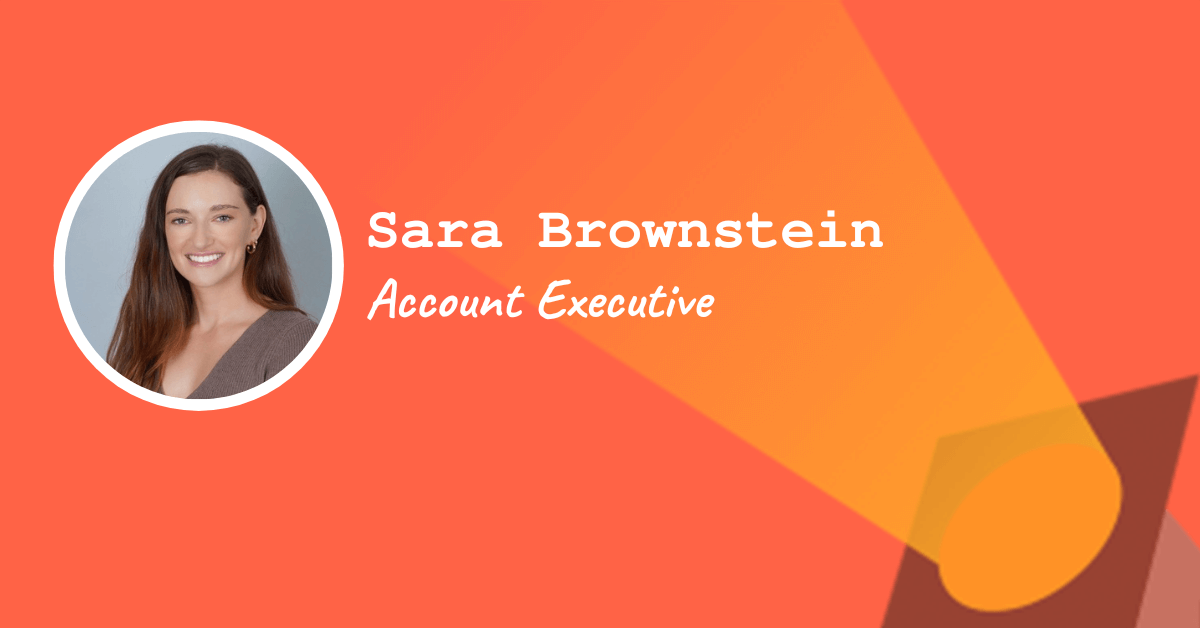This week’s spotlight is on Sara Brownstein, a non-clinical speech-language pathologist who is now an Account Executive for Rocket Software!
This post may contain affiliate links or codes. This won’t increase your cost, but it helps keep TNCPT alive, and free of annoying ads! Thank you for your support. 🙂
What is your full name, title, and company name for your current, primary role?
Sara Brownstein — Account Executive for Rocket Software

Where are you located?
Denver, CO.
Where did you go to SLP school, and what year did you graduate?
University of Central Florida, 2017.
Please refrain from contacting our spotlight participants on social media. There are thousands of readers just like you out there. 🙂 Please ask your questions in the comments on this blog post.
If you’re a Non-Clinical 101 student, you can network with many of our spotlight participants in the alumni groups!
What did you do when you first finished school, and for how long?
During my clinical fellowship, I worked in a nursing home for one year.
In what setting(s) did you work, and what types of patients did you treat?
I have extensive experience across various healthcare settings, including:
- Skilled nursing facilities
- Adult home health
- Schools
- Pediatric outpatient facilities
Throughout my career, I have treated patients of all ages, dealing with a wide range of disorders. During my last year, I worked in a school full time and had two part-time jobs, one in a clinic and another in adult home health.
What did you enjoy about your early roles? What didn’t you enjoy?
I found fulfillment in assisting others. Isn’t that the driving force behind our choice to enter the therapy field? I particularly cherished aiding adults and the elderly in their own homes. The home health environment felt most conducive to patient comfort, allowing me to witness the transformative impact of therapy, especially on individuals with aphasia or swallowing disorders.
Additionally, I derived joy from working with middle and high school students within the school system, particularly in socioeconomically disadvantaged areas. Building genuine connections with students and seeing tangible positive changes in their lives was deeply rewarding.
My primary challenge wasn’t related to the therapy itself, but rather to the strain of juggling three jobs without achieving the financial stability I aspired to. I grappled with the notion that, while therapy was fulfilling, it didn’t offer the career progression I desired.
I longed for a field where success could lead to advancement and upward mobility.
The lack of a clear career trajectory was my main source of dissatisfaction. I sought not just a job I enjoyed but a career with opportunities for growth and advancement.
When and why did you decide to do something non-clinical?
I made the decision to explore non-clinical job opportunities after five years in the field. Despite having gained experience in various settings, I found myself continually yearning for something more.
My inherent ambition left me dissatisfied with the prospect of remaining a therapist indefinitely, without the promise of career advancement or increased earning potential. During the final months of my last school contract, I began to explore alternative career paths to see what other opportunities might be available to me.
What are you doing these days?
These days, I hold the position of Senior Account Executive at a software company. I couldn’t be more grateful for the opportunities that have come my way since transitioning careers. I initially started in an entry-level role as a business development representative and have since been promoted twice.
As an account executive, I play a pivotal role in sales. I am tasked with managing client relationships, driving revenue generation, and strategizing for account growth. My focus lies in building strong rapport with clients by understanding their needs and delivering tailored solutions. Providing exceptional customer service, tracking sales performance, and proactively seeking new business opportunities are all integral parts of my responsibilities.
This career transition has been a tremendous learning experience for me, and I find myself gaining new skills and knowledge every day.
Are you still treating patients, or are you solely non-clinical?
I am solely non-clinical at the moment. I am considering working PRN or part time in the future.
How long have you been in your current role?
Since January 2023.
What do you wish you would’ve known before going into this account executive role?
Before stepping into this role, I wish I had realized the importance of handling rejection. In sales, hearing “no” from clients is part of the job, and it took me some time to understand that it’s not a reflection of my abilities.
Perseverance in the face of rejection has been a key lesson learned in this role.
Did you get any special certifications or training along the way to help you get into your current role?
I had no special training. I read some sales books, listened to podcasts, and watched YouTube videos.
How did you find your job? Did you apply or find it through a connection?
I did not have a connection; I got my first role in my company by applying to a job post.
Did you do anything special to your resume and cover letter to land the job?
I did. I spoke with another speech therapist who had transitioned out, and I completely changed my resume. I shifted the focus from treating disorders to highlight goal attainment with patients.
What was the interview like for the role?
The interview process was nerve-racking because I had never interviewed outside of my field before. I dedicated a lot of time to preparing and went through two rounds of interviews. Throughout the process, I emphasized my strong work ethic and eagerness to expand my knowledge and skills.
How have people reacted to you leaving patient care?
The people in my life have all reacted with support. I’ve encountered numerous speech therapists who are unhappy in their careers, and some of them even pursued non-clinical paths after I did. Additionally, my parents were understanding and supportive of my decision to transition out of the clinical field.
Reach to launch your own non-clinical career?
What’s a typical day or week in the life like for you? What types of tasks and responsibilities fill your time?
In my role as an account executive, my typical day involves managing client relationships, driving revenue generation, and collaborating with internal teams. This includes daily tasks such as calling and emailing customers to address their needs and provide support.
Overall, my days are dynamic, focusing on achieving success for both clients and my company.
What are some of the rewards of your role? What are the biggest challenges?
Some of the rewards of my role include the satisfaction of building strong relationships with clients and assisting them in achieving their goals. Witnessing the tangible impact of my efforts in driving revenue growth and supporting my clients with their business objectives is fulfilling.
Some of the biggest challenges in my role involve time management and prioritization, especially when juggling numerous accounts and potential solutions to offer.
It can be daunting to feel confident in a career where I still have limited experience, but I’m committed to learning and improving every day.
How did your clinical background prepare you for this role? Which skills transferred?
Skills like communication, relationship-building, and problem-solving—honed through diagnosing and treating communication disorders—transfer to client management and sales. From actively listening to identifying needs, my previous experience with patients helps me foster trust and partnership with my clients now.
Plus, my knack for developing treatment plans has equipped me with strong organizational skills vital for strategizing account growth and managing multiple clients efficiently. I also draw on the empathy and patience I learned from clinical practice to address client concerns, which has been incredibly beneficial in forming meaningful connections with them.
Roughly speaking, how are the hours and pay compared to patient care?
When I was working three jobs, I was working over 50 hours per week. Now, I work 40 hours per week and earn significantly more.
What type of person do you think would do well in your account executive role?
People who thrive in fast-paced environments, communicate effectively, and can bounce back from challenges are a great fit for my role as an account executive.
Being able to build relationships, understand client needs, and offer creative solutions is key. Overall, those who are driven, resourceful, and enjoy working with others tend to do well in this position.
Do you work remotely or onsite?
I work entirely remotely and absolutely love it.
Did you read any books, take any courses, or do anything special overall to get you where you are today?
After joining my current position, I enrolled in a sales course offered by my company called the Sandler Selling System. Additionally, I’ve delved into several business and sales books, such as:
I regularly tune into sales-related podcasts and watch numerous YouTube videos on business development.
What is a typical career path for someone in your account executive role?
A common career trajectory often begins with a role as a business development representative, followed by advancement to an account executive position. From there, individuals may progress to senior account executive and potentially transition into management roles.
What is next for you? What are your high-level career aspirations?
I believe my ultimate career goal is to step into a management role. I aspire to lead my own team and serve as a mentor to others in the future.
What would you recommend to someone who is considering going into a role like yours? Do you have any special words of wisdom for the readers?
If you’re thinking about getting into sales, my advice would be to work on your communication skills and people skills.
Building relationships and understanding what your clients need is key. Also, don’t hesitate to learn from different sources like sales courses, books, podcasts, or finding a mentor.
Keep an open mind to learning, and be ready to adapt when things don’t go as planned. And remember, in sales, you’ll face rejection, but staying resilient and bouncing back is what really counts.
What career advice would you give yourself that you wish you had during school?
If I could give myself some advice, I’d suggest considering fields like engineering, IT, or business-related roles for their clear career paths and remote work opportunities.
But if I were speaking to my past self studying speech therapy, I’d reassure myself that everything will be okay. I’d encourage myself to maintain ambition and trust that things will fall into place.
What would you teach to today’s graduate students in your profession, if you had the opportunity?
I’d aim to offer them a more realistic perspective on what the field is really like. Personally, I don’t feel like grad school fully prepared me for the “real world.” I’d also want students to understand that if things don’t work out as planned, it’s going to be okay, and you will have other options.
Do you have any special advice for others who want to follow in your footsteps?
My advice is to seek out a mentor, ask questions, and put in the effort. Having someone who’s already where you want to be is invaluable—it provides clear guidance on how to reach your goals.
Additionally, for those interested in sales, I’d encourage applying to business development positions. While entry level, it’s a great starting point that allows you to learn and grow within the industry. Treat it as a learning experience, and use it as a stepping stone to progress further in your career.





